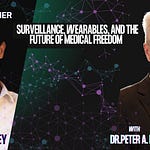What if the future of human potential isn’t in the brain—but in our limbs?
In this electrifying episode of The AI Philosopher, we sit down with Dr. Connor Glass, founder and CEO of Phantom Neuro, a company reshaping the boundaries of human-machine integration. Connor’s mission? To give people back their lost function—not with brain chips, but through a minimally invasive implant that sits just under the skin and connects muscle signals to robotic prosthetics, exoskeletons, and other assistive tech.
It sounds sci-fi. But it’s real. And it’s happening now.
Connor walks us through how Phantom’s tech sidesteps the risks of brain-computer interfaces by tapping into the peripheral nervous system instead. The result? Life-changing tools for people with spinal injuries, quadriplegia, and limb loss, without needing brain surgery.
But this conversation goes far beyond medicine.
We explore exoskeletons as mobility tools for the elderly… and Iron Man-style military gear. We look at how AI could speed up development, how China might outpace the U.S. due to looser regulations, and what happens when quantum computing and autonomous robots collide with human intention.
From Martian terraforming suits to underwater exploration and the coming of a “Super Olympics” where anything goes, we imagine a future where exosuits could let us run faster, jump higher, and venture farther than evolution ever intended.
Yet it’s not all techno-optimism. Connor sounds the alarm on a creeping cognitive offload… how overreliance on AI tools like ChatGPT could leave us vulnerable if the grid ever goes down. He talks candidly about the challenge of raising kids in an AI-saturated world: How do we preserve critical thinking, self-reliance, and analog skills without rejecting the tools that enhance our lives?
We end on a note of hope: currently, most of this tech is being developed to help people: amputees, the elderly, the disabled—live fuller, freer lives. And that’s a future worth fighting for.
If the 20th century gave us dreams of flying cars, the 21st is giving us exoskeletons, and AI-enhanced humans. The question isn’t if this world is coming.
It’s who we want to be when it gets here.









